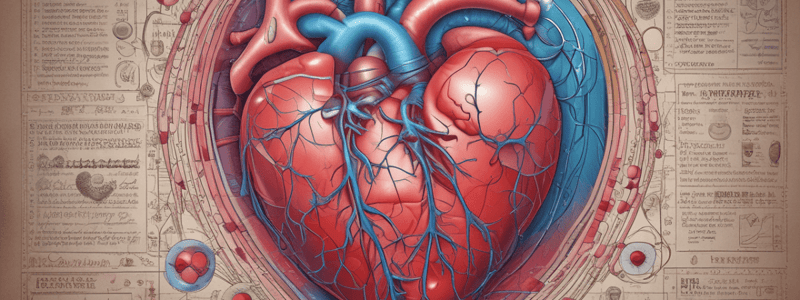Podcast
Questions and Answers
Which of the following drugs are first-line treatments for heart failure with signs of volume overload?
Which of the following drugs are first-line treatments for heart failure with signs of volume overload?
- Beta blockers
- Diuretics (correct)
- ACE inhibitors
- Aldosterone antagonists
What is the typical dosing range for Lisinopril?
What is the typical dosing range for Lisinopril?
10-20 mg
Aldosterone antagonists should be added to therapy for all heart failure patients.
Aldosterone antagonists should be added to therapy for all heart failure patients.
False (B)
What is the approved use of Sacubitril/valsartan (Entresto)?
What is the approved use of Sacubitril/valsartan (Entresto)?
The typical daily target dose of Metoprolol XL is ___ mg.
The typical daily target dose of Metoprolol XL is ___ mg.
Vericiguat is used to improve left ventricular ejection fraction (LV EF).
Vericiguat is used to improve left ventricular ejection fraction (LV EF).
Which of the following is an aldosterone antagonist?
Which of the following is an aldosterone antagonist?
Flashcards are hidden until you start studying
Study Notes
Heart Failure Treatment
- Diuretics are first-line drugs for signs of volume overload or history of volume overload, but excessive diuresis must be avoided to prevent compromised tissue perfusion.
Diuretics
- Loop diuretics are preferred due to their ability to promote fluid loss even with low GFR.
- Limited to symptom reduction only.
ACE Inhibitors
- Block production of angiotensin II, decrease release of aldosterone, and suppress degradation of kinins.
- Influence on remodeling is largely due to elevation of kinins.
- Lisinopril has a convenient once-a-day dosing schedule.
- Typical dose is 10-20mg, with a lowest dose of 2.5mg and highest dose of 40mg.
Angiotensin Receptor Blockers (ARBs)
- Help improve left ventricular ejection fraction (LV EF) and reduce HF symptoms.
- Do not increase bradykinin, so do not have the same effect on remodeling as ACEs.
- Should only be used if not tolerable to ACEs.
Sacubitril/Valsartan (Entresto)
- Increases natriuretic peptides while suppressing negative effects of the renin-angiotensin-aldosterone system (RAAS).
- Approved for patients with stages II-IV HF to be used in place of an ACE or ARB.
- Adverse effects include angioedema, high potassium, and hypotension.
- Due to angioedema risk, patients switching from ACE to Entresto need 3 days off ACE before starting.
Aldosterone Antagonists
- Spironolactone and eplerenone are added only in patients with persistent symptoms despite adequate treatment with ACE and beta blocker.
- Adverse effect: hyperkalemia.
ARNi (Angiotensin Receptor Neprilysin Inhibitor)
- Should not be administered with ACE or within 36 hours of last dose of ACE.
- ACE and ARNi should not be given to patients with a history of angioedema.
Beta Blockers
- Carvedilol, bisoprolol, and sustained-release metoprolol can improve LV EF, slow progression of HF, and reduce contractility.
- Recommended as first-line therapy for most patients.
- Carvedilol: 25mg twice daily, with benefits seen at dosages of 6.25mg twice daily.
- Metoprolol XL: target dose of 200mg daily, with benefits seen at 100mg XL daily.
Vericiguat
- New guanylate cyclase stimulator approved to reduce risk of cardiovascular death and HF hospitalization following hospitalization for HF or need for outpatient IV diuretics in adults with symptomatic HF and EF.
Studying That Suits You
Use AI to generate personalized quizzes and flashcards to suit your learning preferences.




